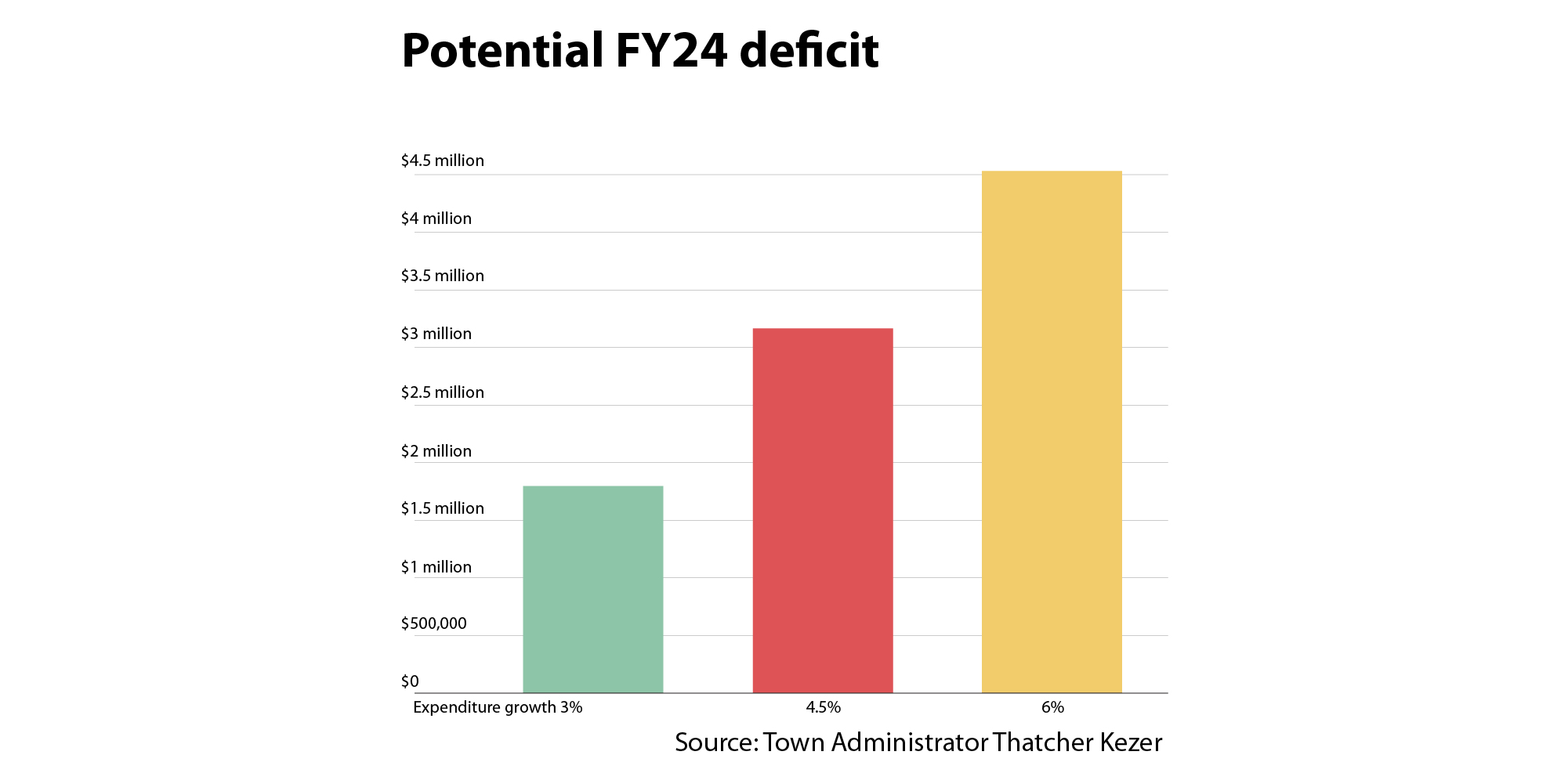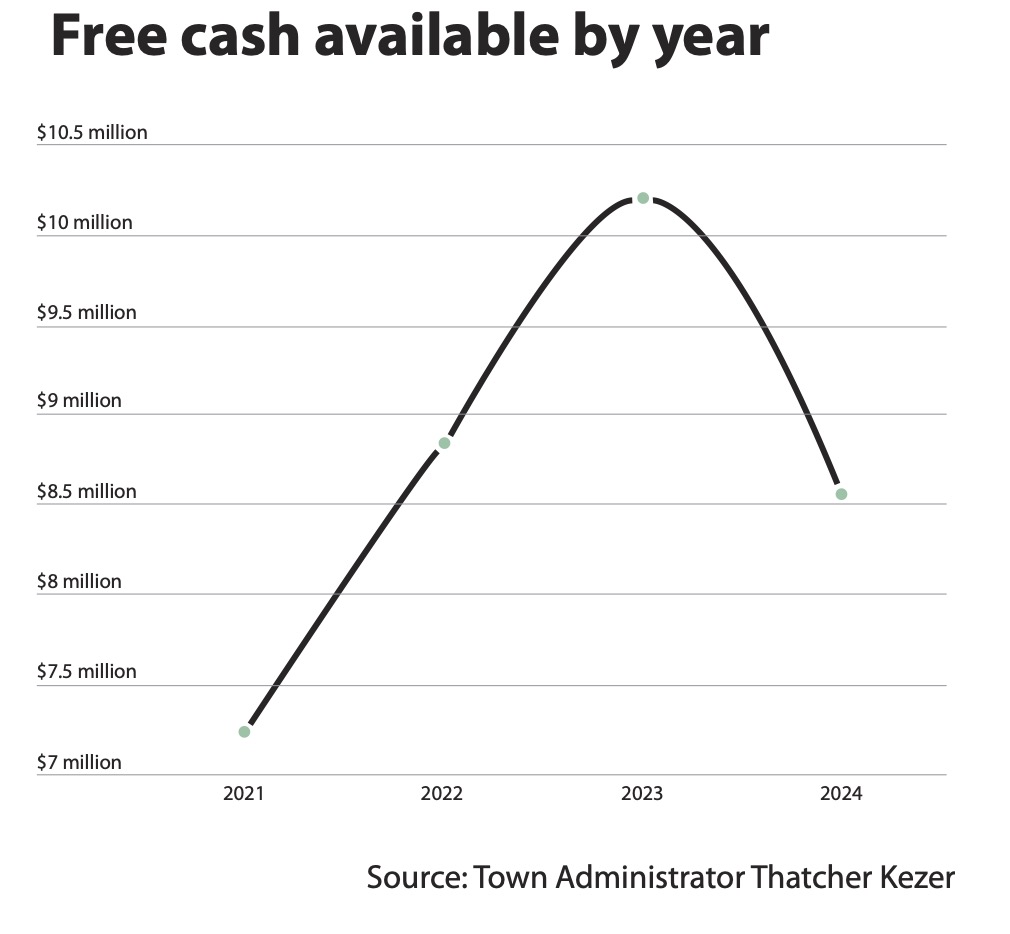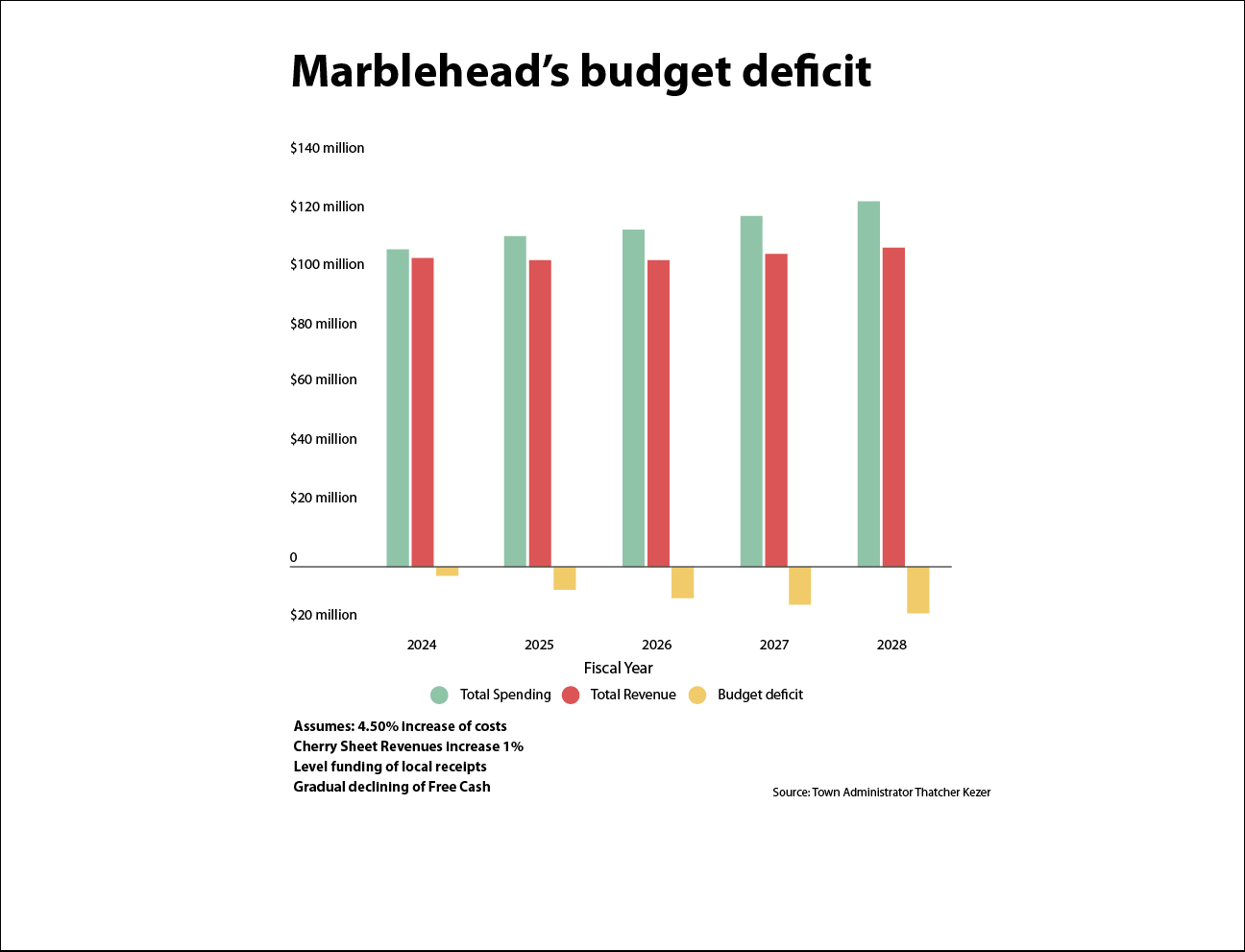Marblehead is facing a growing budget deficit fueled by a historical reliance on free cash and stagnant revenue growth that could swell up to $15 million in the next five years and impact the town’s ability to offer services to residents.
Town Administrator Thatcher Kezer, hired last May, is tasked with pulling the town out from that looming hole. He explained that Marblehead is now spending free cash — end-of-year revenues that have come in over estimate and expenditures that have come in under budget — at a rate faster than it is replenishing it.
“What I have seen for this fiscal year is that one of the reasons free cash is expected to drop for this next year is that there wasn’t an adjustment or an increase in expected local receipts,” Kezer said, explaining that local receipts are a category of revenue that come into the town through fees and payments.
Those numbers have traditionally been underestimated, but last year the estimate was increased, he said.
“That provides more revenue in the current fiscal year for expenses, but it decreases the free cash for the following year,” Kezer said.
Kezer laid out the fiscal challenges facing the town in his state of the town presentation last month, detailing the deficit at different expenditure growth levels for the next fiscal year. At 3 percent, the deficit would sit at $1.7 million, at 4.5 percent, the deficit would sit at $3.1 million, and at 6 percent, the deficit would rise to $4.5 million for fiscal year 2024 (the municipal spending year that begins on July 1, 2023).

Assuming expenditures grow at 4.5 percent per year for the next five years, (a scenario Kezer deemed the most likely), state aid revenues increase 1 percent annually, funding of local receipts remains level, and free cash gradually declines, the annual deficit would grow to $7.9 million in FY25, $10.7 million in FY26, and $13.2 million in FY27, before finally reaching $15.8 million in FY28.
Select Board Chair Moses Grader, who previously served on the Finance Committee, explained the primary drivers of the growing structural deficit are increases in salaries and benefits as part of the collective bargaining agreement the town entered into in 2021. Free cash had been used as a way to plug the budget deficit, but with local receipts on the decline, the amount of free cash the town can expend is diminished.
Grader said Kezer stood out as the board looked for a replacement for Town Administrator Jason Silva, who resigned last January, because of his experience in municipal government. Kezer previously served as the mayor of Amesbury and chief operating officer in Framingham.
“When we realized we were moving toward a deficit situation, Thatcher really distinguished himself by his experience … he’s had to deal with structural budget deficits. That experience is very important,” Grader said.
As a result of conservative budgeting, Marblehead developed a deep reserve of free cash to use as a cushion should a scenario such as the current one arise. Grader said town officials planned ahead for the structural deficit and are planning to make a case to town voters to override Proposition 2 1/2 and raise taxes to help plug the projected deficit.
“Knowing ultimately that we would come up, potentially to an override, it’s really crucial to present credible numbers. And I’m very confident that Thatcher can help us do that,” Grader said. “My experience has been in town that if you explain to the taxpayer very clearly and very openly why you need more money, the taxpayers are generally very respectful of that.”
Indeed, an article asking town voters to supplement the “town’s general government operating budget” appears on the Annual Town Meeting Warrant, set for May 1, as article 31.
Grader also pointed to an inability to grow the revenue the town brings in each year — with roughly $105 million projected for FY24, up just $1.3 million from the previous year’s figure — as a key part of the problem.

Kezer explained that one of the main ways the town earns money is through new growth via property taxes collected on new developments or improvements.
“One of the significant things for municipalities to survive financially is to have a focus on creating that new growth development but new growth development that meets the character of the community too,” Kezer said.
Growth has been a challenge in a densely packed community like Marblehead.
“It is because we’re such a densely populated community, there’s very little room for development growth. It’s pretty challenging to significantly increase our new growth numbers,” Grader said. He explained that town officials are preparing the budget as if the override will not pass — with departments instructed to amend their budgets so the deficit will be plugged.
“One of the things we’ve got to do is that we’ve got to in the next week, a couple weeks or so, really narrow down what the structural deficit is for next year,” Grader said. “We’re going to ask the departments, all the departments of the town to find ways to make reductions in order to meet that $1.8 million deficit [if expenditures increase 3 percent]. We have to live under a budget, we have to meet a budget, under the assumption that an override won’t pass.”
In an effort to lower costs, the town will be looking at what are called “big ticket items” or “items that the town is obligated to pay for” such as health insurance.
“Health insurance costs, in our budget that’s a $15 million line item,” Kezer said. “Everybody knows the stories of health care costs going up significantly … We have to negotiate with the employees and we have to procure and negotiate with different health insurance providers to get the best deal for the town.”
As a result, Kezer said some town services may be impacted depending on the “signifcancy of the cuts” officials are forced to make.
“As part of my State of the Town Address, I identified the five core functions that we provide: public education, infrastructure, public safety, health and human services,” he said. “Those are things we provide. We’re not going to be able to provide all those services at the level that we’re currently providing them.”
The town is in the “first major step of meeting this challenge” by creating a balanced budget for FY24, Kezer said.
“We’re focused right now on the first step of developing a balanced budget based on the revenues that we know that we have,” Kezer said. “Once we’ve accomplished that step in the process, then the discussion will be potential override, what is it that we need in order to fix the structural deficit that provides the funding we need just to continue the level of services that we have now.”
Grader said despite the structural deficit, he has faith that Kezer alongside newly hired Finance Director Aleesha Nunley Benjamin will be able to put the town in a strong financial position moving forward.
“I think we’re going to be in a much better position next year,” he said. “Once we have our budgetary systems in place, and once Thatcher has had more time with our new finance director to prepare financials, to take a look at what the future years are going to look like. I see very much this year basically plugging the structural deficit gap, and next year in fiscal year 2025 looking out into the future where we’re going to also have a better sense of what the inflationary picture is.”

